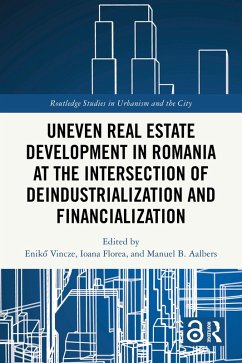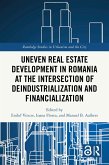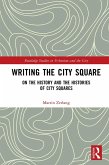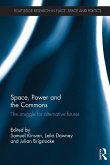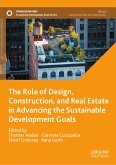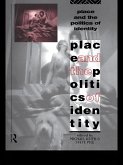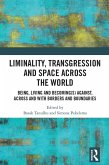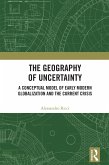Uneven Real Estate Development in Romania at the Intersection of Deindustrialization and Financialization (eBook, PDF)
Redaktion: Vincze, Eniko; Aalbers, Manuel B.; Florea, Ioana
42,95 €
42,95 €
inkl. MwSt.
Sofort per Download lieferbar

21 °P sammeln
42,95 €
Als Download kaufen

42,95 €
inkl. MwSt.
Sofort per Download lieferbar

21 °P sammeln
Jetzt verschenken
Alle Infos zum eBook verschenken
42,95 €
inkl. MwSt.
Sofort per Download lieferbar
Alle Infos zum eBook verschenken

21 °P sammeln
Uneven Real Estate Development in Romania at the Intersection of Deindustrialization and Financialization (eBook, PDF)
Redaktion: Vincze, Eniko; Aalbers, Manuel B.; Florea, Ioana
- Format: PDF
- Merkliste
- Auf die Merkliste
- Bewerten Bewerten
- Teilen
- Produkt teilen
- Produkterinnerung
- Produkterinnerung

Bitte loggen Sie sich zunächst in Ihr Kundenkonto ein oder registrieren Sie sich bei
bücher.de, um das eBook-Abo tolino select nutzen zu können.
Hier können Sie sich einloggen
Hier können Sie sich einloggen
Sie sind bereits eingeloggt. Klicken Sie auf 2. tolino select Abo, um fortzufahren.

Bitte loggen Sie sich zunächst in Ihr Kundenkonto ein oder registrieren Sie sich bei bücher.de, um das eBook-Abo tolino select nutzen zu können.
This book examines the progression of real estate development within the deindustrialization-financialization nexus. It explores the roles it has in semi-peripheral contexts such as Romania.
- Geräte: PC
- mit Kopierschutz
- eBook Hilfe
Andere Kunden interessierten sich auch für
![Uneven Real Estate Development in Romania at the Intersection of Deindustrialization and Financialization (eBook, ePUB) Uneven Real Estate Development in Romania at the Intersection of Deindustrialization and Financialization (eBook, ePUB)]() Uneven Real Estate Development in Romania at the Intersection of Deindustrialization and Financialization (eBook, ePUB)42,95 €
Uneven Real Estate Development in Romania at the Intersection of Deindustrialization and Financialization (eBook, ePUB)42,95 €![Writing the City Square (eBook, PDF) Writing the City Square (eBook, PDF)]() Martin ZerlangWriting the City Square (eBook, PDF)42,95 €
Martin ZerlangWriting the City Square (eBook, PDF)42,95 €![Space, Power and the Commons (eBook, PDF) Space, Power and the Commons (eBook, PDF)]() Space, Power and the Commons (eBook, PDF)43,95 €
Space, Power and the Commons (eBook, PDF)43,95 €![The Role of Design, Construction, and Real Estate in Advancing the Sustainable Development Goals (eBook, PDF) The Role of Design, Construction, and Real Estate in Advancing the Sustainable Development Goals (eBook, PDF)]() The Role of Design, Construction, and Real Estate in Advancing the Sustainable Development Goals (eBook, PDF)121,95 €
The Role of Design, Construction, and Real Estate in Advancing the Sustainable Development Goals (eBook, PDF)121,95 €![Place and the Politics of Identity (eBook, PDF) Place and the Politics of Identity (eBook, PDF)]() Place and the Politics of Identity (eBook, PDF)58,95 €
Place and the Politics of Identity (eBook, PDF)58,95 €![Liminality, Transgression and Space Across the World (eBook, PDF) Liminality, Transgression and Space Across the World (eBook, PDF)]() Liminality, Transgression and Space Across the World (eBook, PDF)42,95 €
Liminality, Transgression and Space Across the World (eBook, PDF)42,95 €![The Geography of Uncertainty (eBook, PDF) The Geography of Uncertainty (eBook, PDF)]() Alessandro RicciThe Geography of Uncertainty (eBook, PDF)42,95 €
Alessandro RicciThe Geography of Uncertainty (eBook, PDF)42,95 €-
-
-
This book examines the progression of real estate development within the deindustrialization-financialization nexus. It explores the roles it has in semi-peripheral contexts such as Romania.
Dieser Download kann aus rechtlichen Gründen nur mit Rechnungsadresse in A, B, BG, CY, CZ, D, DK, EW, E, FIN, F, GR, HR, H, IRL, I, LT, L, LR, M, NL, PL, P, R, S, SLO, SK ausgeliefert werden.
Produktdetails
- Produktdetails
- Verlag: Taylor & Francis eBooks
- Seitenzahl: 270
- Erscheinungstermin: 19. Juli 2024
- Englisch
- ISBN-13: 9781040092248
- Artikelnr.: 70745350
- Verlag: Taylor & Francis eBooks
- Seitenzahl: 270
- Erscheinungstermin: 19. Juli 2024
- Englisch
- ISBN-13: 9781040092248
- Artikelnr.: 70745350
- Herstellerkennzeichnung Die Herstellerinformationen sind derzeit nicht verfügbar.
Enik¿ Vincze is a professor at Babe¿-Bolyai University, Cluj, Romania. Initiator of the local movement C¿¿i Sociale ACUM!/ Social Housing NOW!, she is also involved in national and international housing justice struggles. In her early career, Enik¿ published on nationalism, feminism, and the socio-spatial marginalization of impoverished Roma. In the past ten years, she conducted academic and militant research on the spatialization and racialization of socio-economic inequalities, local and global politics of housing, territorial and environmental injustice, urban and real estate development, housing regimes in state socialism and neoliberal capitalism, and uneven development and capitalist transformations in Romania. She co-edited the following volumes published in 2018: Racialized Labour in Romania: Spaces of Marginality at the Periphery of Global Capitalism; The Romani Women's Movement: Struggles and Debates in Central and Eastern Europe (Routledge). Among her articles written in 2023 are "The making of a racialized surplus population. Romania's labor-housing nexus" (Focaal, 97: 57-72); "Deindustrialization and the real-estate-development-driven housing regime. The case of Romania in global context" (Studia UBB Sociologia, 68, 1: 25-73); "Residualized public housing in Romania: peripheralization of 'the social' and the racialization of 'unhouseables' " (IJURR, forthcoming). She acted as the director of the project that inspired the present book. Ioana Florea is a sociologist working on urban transformations and manifestations of uneven development in Eastern European cities. She has collaborated as a researcher with The Babe¿-Bolyai University, The University of Gothenburg, and Södertörn University. Ioana is co-author of the monograph Contemporary Housing Struggles. A Structural Field of Contention Approach (2022). Her recent contributions on housing struggles are published in Global Urbanism. Knowledge, Power and the City (Routledge, 2021) and Radical Housing: Art, Struggle, Care (2021). Her co-authored articles are published in the Journal of Political Ecology, Radical Housing Journal, Critical Housing Analysis, and Voluntas. She has been engaged for more than 15 years in policy- and action-orienting research, co-authoring an unprecedented country report Come Closer. Inclusion and Exclusion of Roma in Present Day Romanian Society (2008). Since 2016, she has been involved as an action-researcher for the Common Front for Housing Rights in Romania and for the European Action Coalition for the Right to Housing and to the City. Manuel B. Aalbers is a human geographer, sociologist, urban planner, and a full professor of Geography at KU Leuven, the University of Leuven (Belgium), where he leads a research group on the intersection of real estate, finance, and states, spearheaded by a grant from the European Research Council. Previously, he was at the University of Amsterdam and Columbia University and has been a guest researcher at New York University, the City University of New York, IRS/Leibniz Institute (Germany), the University of Milan-Bicocca, and the University of Urbino (Italy). He has published on financialization, redlining, social and financial exclusion, neoliberalism, mortgage markets, the privatization of social housing, neighborhood decline, gentrification, and the Anglo-American hegemony in academic research and writing. He is the author of Place, Exclusion, and Mortgage Markets (2011) and The Financialization of Housing: A Political Economy Approach (Routledge, 2016) and the editor of Subprime Cities: The Political Economy of Mortgage Markets (2012). He is also the associate editor of the Encyclopedia of Urban Studies (2010), former editor-in-chief of the geography journal TESG (2019-2023), and has served as the guest editor for ten different journals.
Introduction (Enikö Vincze, Ioana Florea and Manuel B. Aalbers)
Part I. Political Economy Transformations and the Role of Real Estate Development
Chapter One. Global pension fund capitalism lands in Romania: Finance-led real estate and retail development (Manuel B. Aalbers)
Chapter Two. The winding road of privatization: a path for real estate development into former state socialist economies (Enikö Vincze and Ioana Vlad)
Chapter Three. De-risking in a context of uneven development and deindustrialized spaces: the advancement and financialization of real estate as business in Romania (Ioana Florea and Enikö Vincze)
Part II. Territorialized Synergies Between Local Public Administrations, Middle Classes, and Real Estate Actors in Second and Third-Tier Cities
Chapter Four. Putting "the fix" in the "spatial fix": restructuring class alliances and financialized real estate in the city of Bârlad (Ioana Florea, Livia Pancu and Florin Bobu)
Chapter Five. Coal-based energy urbanization and real estate development in Târgu Jiu (George Iulian Zamfir)
Chapter Six. Spatial planning at the fringes: land fragmentation and sprawling in Bragadiru (Mihail Sandu-Dumitriu)
Chapter Seven. Challenged by real estate-driven development: the urban growth machine in Cluj (Marina Mironica)
Part III. Re-making the City via Urban Governance, Regeneration, and Branding
Chapter Eight. The pressure of inter-urban competition on entrepreneurial governance aspirations: the case of Craiova (Ioana Vlad)
Chapter Nine. Urban regeneration and transnational capital investments in Re i a brownfields: from the "city of fire" to the "boutique city" (Sorin Gog)
Chapter Ten. The political economy of city rebranding: Bra ov, from an industrial center to the "El Dorado" of real estate development (Enikö Vincze)
Conclusion (Enikö Vincze and Ioana Florea)
Part I. Political Economy Transformations and the Role of Real Estate Development
Chapter One. Global pension fund capitalism lands in Romania: Finance-led real estate and retail development (Manuel B. Aalbers)
Chapter Two. The winding road of privatization: a path for real estate development into former state socialist economies (Enikö Vincze and Ioana Vlad)
Chapter Three. De-risking in a context of uneven development and deindustrialized spaces: the advancement and financialization of real estate as business in Romania (Ioana Florea and Enikö Vincze)
Part II. Territorialized Synergies Between Local Public Administrations, Middle Classes, and Real Estate Actors in Second and Third-Tier Cities
Chapter Four. Putting "the fix" in the "spatial fix": restructuring class alliances and financialized real estate in the city of Bârlad (Ioana Florea, Livia Pancu and Florin Bobu)
Chapter Five. Coal-based energy urbanization and real estate development in Târgu Jiu (George Iulian Zamfir)
Chapter Six. Spatial planning at the fringes: land fragmentation and sprawling in Bragadiru (Mihail Sandu-Dumitriu)
Chapter Seven. Challenged by real estate-driven development: the urban growth machine in Cluj (Marina Mironica)
Part III. Re-making the City via Urban Governance, Regeneration, and Branding
Chapter Eight. The pressure of inter-urban competition on entrepreneurial governance aspirations: the case of Craiova (Ioana Vlad)
Chapter Nine. Urban regeneration and transnational capital investments in Re i a brownfields: from the "city of fire" to the "boutique city" (Sorin Gog)
Chapter Ten. The political economy of city rebranding: Bra ov, from an industrial center to the "El Dorado" of real estate development (Enikö Vincze)
Conclusion (Enikö Vincze and Ioana Florea)
Introduction (Enikö Vincze, Ioana Florea and Manuel B. Aalbers)
Part I. Political Economy Transformations and the Role of Real Estate Development
Chapter One. Global pension fund capitalism lands in Romania: Finance-led real estate and retail development (Manuel B. Aalbers)
Chapter Two. The winding road of privatization: a path for real estate development into former state socialist economies (Enikö Vincze and Ioana Vlad)
Chapter Three. De-risking in a context of uneven development and deindustrialized spaces: the advancement and financialization of real estate as business in Romania (Ioana Florea and Enikö Vincze)
Part II. Territorialized Synergies Between Local Public Administrations, Middle Classes, and Real Estate Actors in Second and Third-Tier Cities
Chapter Four. Putting "the fix" in the "spatial fix": restructuring class alliances and financialized real estate in the city of Bârlad (Ioana Florea, Livia Pancu and Florin Bobu)
Chapter Five. Coal-based energy urbanization and real estate development in Târgu Jiu (George Iulian Zamfir)
Chapter Six. Spatial planning at the fringes: land fragmentation and sprawling in Bragadiru (Mihail Sandu-Dumitriu)
Chapter Seven. Challenged by real estate-driven development: the urban growth machine in Cluj (Marina Mironica)
Part III. Re-making the City via Urban Governance, Regeneration, and Branding
Chapter Eight. The pressure of inter-urban competition on entrepreneurial governance aspirations: the case of Craiova (Ioana Vlad)
Chapter Nine. Urban regeneration and transnational capital investments in Re i a brownfields: from the "city of fire" to the "boutique city" (Sorin Gog)
Chapter Ten. The political economy of city rebranding: Bra ov, from an industrial center to the "El Dorado" of real estate development (Enikö Vincze)
Conclusion (Enikö Vincze and Ioana Florea)
Part I. Political Economy Transformations and the Role of Real Estate Development
Chapter One. Global pension fund capitalism lands in Romania: Finance-led real estate and retail development (Manuel B. Aalbers)
Chapter Two. The winding road of privatization: a path for real estate development into former state socialist economies (Enikö Vincze and Ioana Vlad)
Chapter Three. De-risking in a context of uneven development and deindustrialized spaces: the advancement and financialization of real estate as business in Romania (Ioana Florea and Enikö Vincze)
Part II. Territorialized Synergies Between Local Public Administrations, Middle Classes, and Real Estate Actors in Second and Third-Tier Cities
Chapter Four. Putting "the fix" in the "spatial fix": restructuring class alliances and financialized real estate in the city of Bârlad (Ioana Florea, Livia Pancu and Florin Bobu)
Chapter Five. Coal-based energy urbanization and real estate development in Târgu Jiu (George Iulian Zamfir)
Chapter Six. Spatial planning at the fringes: land fragmentation and sprawling in Bragadiru (Mihail Sandu-Dumitriu)
Chapter Seven. Challenged by real estate-driven development: the urban growth machine in Cluj (Marina Mironica)
Part III. Re-making the City via Urban Governance, Regeneration, and Branding
Chapter Eight. The pressure of inter-urban competition on entrepreneurial governance aspirations: the case of Craiova (Ioana Vlad)
Chapter Nine. Urban regeneration and transnational capital investments in Re i a brownfields: from the "city of fire" to the "boutique city" (Sorin Gog)
Chapter Ten. The political economy of city rebranding: Bra ov, from an industrial center to the "El Dorado" of real estate development (Enikö Vincze)
Conclusion (Enikö Vincze and Ioana Florea)
